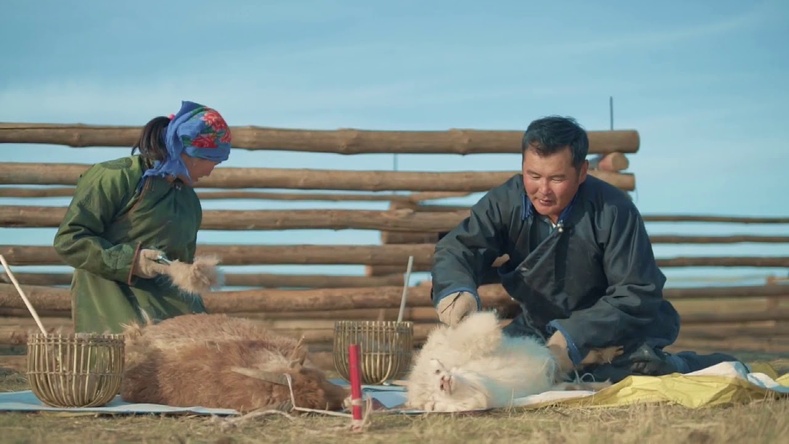
Is it true that goats are killed for cashmere? The answer is no.
The cashmere is typically removed by hand using a metal comb with sharp teeth. But the process of cashmere shearing is a little bit painful process.
then it is important to remove their fur to protect them from the hot weather. It prevents them from getting hot in the summer and getting sick of diseases related with rising temperatures.
In addition, the killing of goats for their cashmere does not help the environment.
However, there are some reports of goats being killed in the cashmere industry, either because they are sick or injured.
In most cases, herders kill the goats for food-consuming purposes.
The cashmere of the goats is cleaned and sorted. The best hairs are then washed and woven into luxurious garments.
Despite the ethical concerns, the goats are not killed for their cashmere.
Indeed, The dzud phenomenon, which occurs in Mongolia when the weather turns cold and drier, affects the quality of cashmere and makes the goats’ lives difficult.
This phenomenon kills more goats and herders say that goats are impatient and hard to survive compared with sheep during the harsh wintertime in Mongolia.
The herders see the goats as an investment and treat them as pets. In reality, the overpopulation of goats is threatening the health of the environment.
People do not know that goat eats grass with roots. It means that grass is hard to recover for decades. it accelerates desertification.
But Herders in Mongolia tend to raise more goats because of cashmere prices. 1-kilo averages around 35-50 USD.
In fact, the goat’s meat is also sold for cheap which is why these animals are not killed for cashmere.
The herders are more likely to sell sheep for food purposes because they can profit more than goats.
Some of the goats are not even suitable for cashmere production. Because they can not produce high-quality cashmere.
The process of cashmere production is a long and complex process. While cashmere is the most sought-after luxury fiber, it is the only material that is used in the fashion industry.
Since cashmere production is not directly responsible for the deaths of goats, it is an important aspect of the process. There is no direct correlation between the death of the goats and the killing of the goats for cashmere.
Table of Contents
The Cashmere Production Process
To better understand the journey of cashmere from goat to garment, let’s take a closer look at the cashmere production process:
1. Grooming and Shedding
During the spring shedding season, cashmere goats naturally release their soft undercoat. Responsible farmers carefully groom and comb the goats to collect the shed fibers without causing any harm.
2. Sorting and Cleaning
The collected cashmere fibers undergo a meticulous sorting process, where impurities like dirt, vegetation, and coarse hairs are removed. This ensures that only the finest, softest fibers are used for the production of cashmere products.
3. Spinning
The sorted cashmere fibers are then spun into yarns, ready to be used by skilled artisans and designers in the creation of high-quality cashmere garments.
4. Designing and Manufacturing
Fashion designers and manufacturers use these premium cashmere yarns to craft a wide range of luxurious products, including sweaters, scarves, shawls, and more.
Ethical Concerns in the Cashmere Industry
The growing demand for cashmere has led to an increase in the number of cashmere goats worldwide. While this may seem harmless, it has raised some ethical concerns:
1. Overgrazing and Environmental Impact
The large herds of cashmere goats have led to overgrazing in certain regions, depleting the vegetation and causing soil degradation. This, in turn, has adverse effects on local ecosystems and biodiversity.
2. Unethical Farming Practices
As mentioned earlier, some farmers resort to inhumane practices such as shearing goats out of season or killing them for their cashmere, compromising the welfare of these animals.
3. Exploitation of Workers
In regions where cashmere farming is prevalent, labor practices might not always meet ethical standards. Workers may face low wages, long hours, and poor working conditions.
Sustainable Cashmere Farming and Alternatives
Thankfully, many organizations and farmers are recognizing the need for ethical and sustainable cashmere farming practices. Here are some positive steps being taken:
1. Sustainable Farming Practices
Responsible farmers are adopting sustainable grazing management techniques to prevent overgrazing and preserve the delicate ecosystems in which cashmere goats thrive.
2. Ethical Certification
Some brands and organizations now offer cashmere products with ethical certifications, ensuring that the cashmere is sourced responsibly and without harm to the goats.
3. Alternative Fibers
In recent years, sustainable alternatives to cashmere have emerged, such as plant-based fibers like bamboo, modal, or Tencel, which offer comparable softness and warmth without the ethical concerns associated with traditional cashmere
FAQs about Cashmere and Its Production
Are goats harmed in the cashmere production process?
No, goats are not harmed during the ethical cashmere production process. The fibers are collected during the natural shedding season, ensuring the goats’ well-being.
How can I ensure that the cashmere I buy is ethically sourced?
Look for products with ethical certifications like the Good Cashmere Standard (GCS) or the Responsible Wool Standard (RWS) to ensure that the cashmere is sourced responsibly and without harm to the animals.
Is cashmere biodegradable?
Yes, cashmere is biodegradable since it is a natural fiber. However, it takes longer to decompose compared to plant-based fibers.
What are some sustainable alternatives to cashmere?
Sustainable alternatives to cashmere include bamboo, modal, and Tencel, which offer similar softness and warmth without the ethical concerns associated with traditional cashmere.
How can I support sustainable cashmere farming?
Support sustainable cashmere farming by choosing products from brands that follow ethical practices, opting for quality over quantity, and raising awareness about the importance of ethical consumer choices.
Can cashmere production be cruelty-free?
Yes, cashmere production can be cruelty-free if it adheres to ethical practices, such as collecting fibers during the natural shedding season and ensuring the goats’ well-being.
